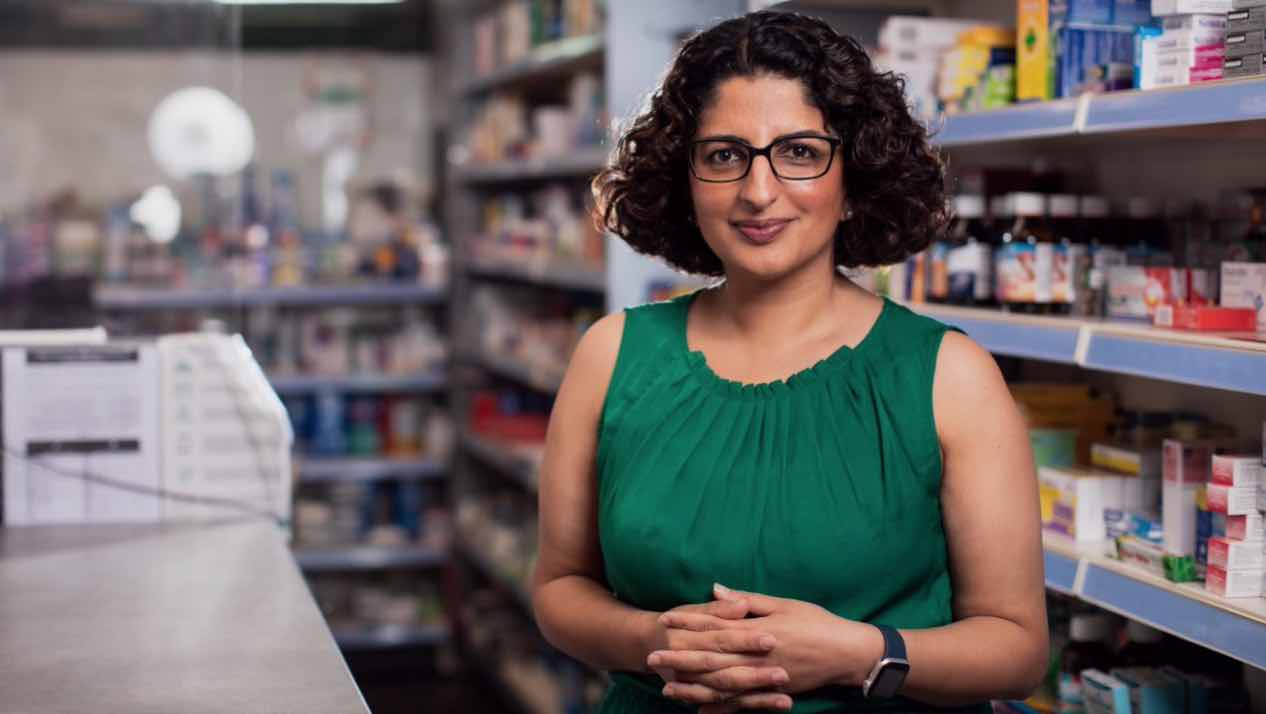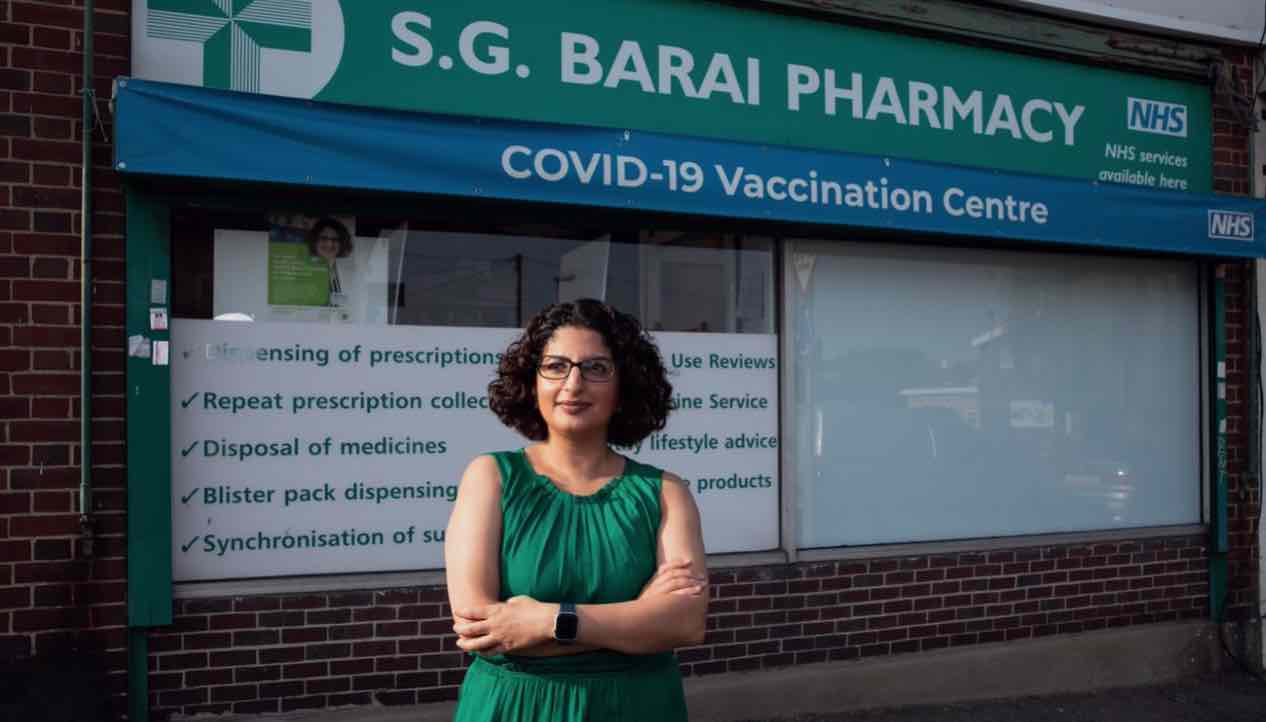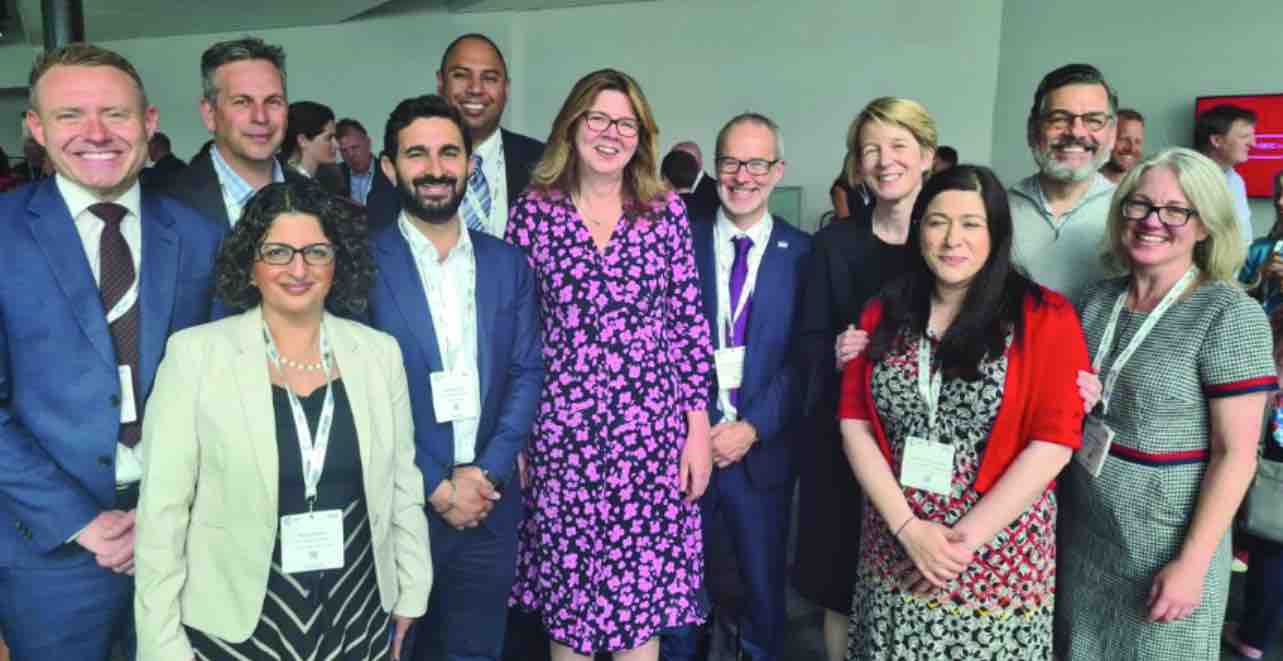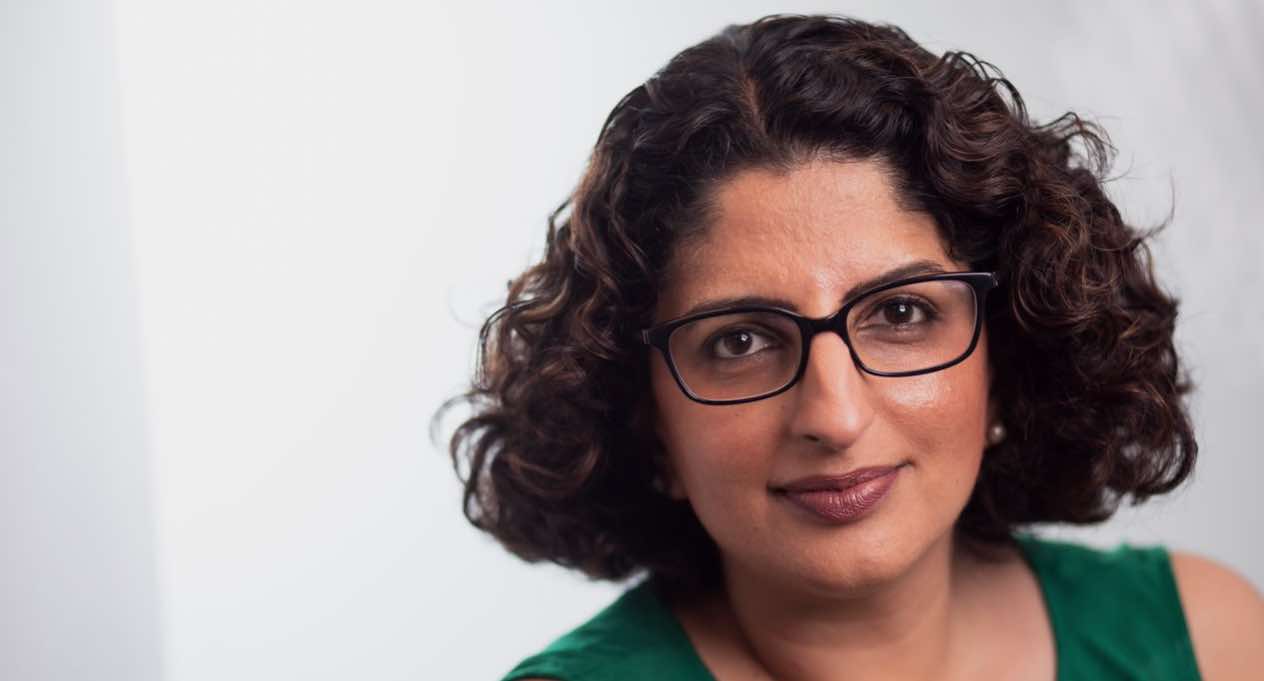In Interviews
Follow this topic
Bookmark
Record learning outcomes
By Rob Darracott
There’s a small framed photograph on the counter. A little girl is standing in the doorway of a pharmacy on a street corner. The exterior of the south west London pharmacy has been updated since the photograph was taken 40 or so years ago, but the name on the fascia hasn’t – SG Barai Pharmacy.
It’s late. Today’s photographer has been and gone. Reena Barai, the girl in the photograph, is sitting, in pharmacy green, in the customer area of the pharmacy she has called home and work since 1979. The Perspex screens are still up; a ‘thank you’ wall inside the door notes that 10,000 Covid vaccinations and counting have been done in the consultation room opposite the entrance. There’s a care homes dispensary out the back, reached from the main dispensing area to one side, or via a couple of steps up from the middle of the space behind the counter. It’s not a big space.
“We used to live upstairs. I spent my time sitting on that bottom step, listening to everything going on,” says Reena. “I feel like I was part of my parents’ conversations. I remember the discussion around the table about moving from a typewriter to their first PMR, for example. It was a lot of money; is this the future? Can we afford it? As I got older, I put bottle tops on bottles, stuck Alliance labels on packs. I always wanted to be here, and patients loved the bubbly little child that wanted to open the door for everybody.
“I’ve got patients coming for their over 75s’ booster jabs who remember me as a little girl. I park my car down the road and I bump into so many people I know as I walk up. The theme song to Cheers – ‘Everybody knows your name’? That’s exactly what it feels like.”
Reena Barai’s parents bought the pharmacy in Sutton, south-west London, in 1979 from a pharmacist who’d had it for the previous 30 years. It wasn’t the best pharmacy in the world, but they thought it might be a starting point. They never left. Her father, Subhash, passed away 25 years ago, but her mother, Kapila, who is still responsible for the buying and bookkeeping, “comes in when she wants”.
“My dad wasn’t a loud, confident character, but he was patient-orientated, clinical and incredibly kind, so maybe I get some of those traits from him,” Reena says. “He loved this shop; we were open long hours, all day Saturdays, but I never resented him working so much because I understood the value he had. People respected him – they used to call him ‘doc’. When he passed away, people literally sobbed at the counter. There’s something in that about legacy. It’s probably why I do what I do.”
As a pharmacy student, Reena wanted to be the scientist who found the cure for cancer. But while the prospect of discovery was exciting, she decided she was not cut out for lab work during a holiday job at the Leukaemia Research Fund between her second and third years. A placement at Great Ormond Street that same summer had more appeal, so with a long-term pharmacist installed in the family pharmacy as her father was unwell, she opted for a pre-registration year in a London teaching hospital.
“My dad died a week before my interview and I messed it up badly. I thought it was the end of the world,” she says. Fortunately, the chief pharmacist at St Helier, the district general down the road from her home, saw something in Reena in that interview and offered her a job.
She spent five years in hospital pharmacy. She worked at King’s College Hospital after qualifying, then returned to St Helier where the small staff complement meant she gained skills as a renal pharmacist, a special care baby unit pharmacist, and a cardiac pharmacist.
A decision to make

But when the pharmacist back in Sutton became ill, Reena’s mother told her she had a decision to make. “I have to say, I took over begrudgingly,” she says now. “I had the most exciting career, I was at the top of my clinical game; I thought I was just going to die professionally. Boy, was I wrong.”
It was 2003. The ‘new contract’ was just around the corner. “There were lots of challenges. A new way of doing things, new services like medicines use reviews. I haven’t looked back.”
For the last 15 years, the pharmacy has run with two pharmacists, although Reena has been experimenting with a three-pharmacist model for the last year or so, while running the Covid vaccination site.
On a normal weekday, the staff number five or six. There are pharmacists Perdita and Shirina as well as Reena – locum Meenu was in on the day we visited. Dispenser Wendy is the longest serving member of the current team – she has been with Reena for six years. Technician Luke arrived a year ago. Reena has known trainee dispenser Niamh since she would come into the pharmacy as a child with her grandfather. And of course, there’s Reena’s mum – ‘Mrs B’ – “telling me off if I’ve ordered bendro from the wrong company because it’s 10p cheaper somewhere else”.
“Over 43 years, we have only ever had 20 members of staff, although they’re not really staff – they’re part of the team,” Reena says. “They work with me for years and they’re still my patients now, unless they’ve passed away. That’s the beauty of a small pharmacy that’s family run. When I took over, it was just me and one counter assistant. Now, because we vaccinate, there’s always somebody in the consulting room. One pharmacist out here serving, dispensing, checking. Care homes – a big part of our business – that’s a person out the back.
“The three-pharmacist model is a trial. Does it give me flexibility to take on other roles? It’s not easy to go to things you think you should when you run a pharmacy. I can just walk out or nip upstairs to the office and have a Zoom call. Does it improve the business? Can we become a lot more service-orientated, so it pays for itself? I don’t know why we’re arguing about whether we can run a pharmacy without a pharmacist when you think what you can achieve with three. I go to bed every night knowing we’ve done the best we could do. Nobody is stressed. Nobody hates their job. Everyone’s putting patients first.”
“I love community pharmacy. You have a long-standing relationship with your patients. You build trust. Community pharmacy, especially independent pharmacy, is the safety net. We’re there. People are grateful for what we do. You see what happens to them. Just today, I’ve had two people ring me to say what I told them on Saturday was right. That’s lovely.”
The road to leadership
Worried she’d be bored when she first started back in the pharmacy, Reena did not turn down opportunities to continue to explore. She had a one day a week role in GP practices in the first wave of such work. She became a CPPE tutor when she returned to full-time practice after having her two children.
When I first met her – as a rather feisty neighbour at a pharmacy dinner a decade or more ago – she was the pharmacist in a local ‘help yourself to health’ health literacy initiative. A team of health and social care professionals visited mosques, temples, Sure Start Centres, special schools for excluded kids, women’s shelters. “It was an eye opener into population health, and how little people knew about pharmacy,” Reena says. “We scored highly in how it helped people to think about their health. Then the money ran out.”
She became the community pharmacy locality lead for the CCG, then the primary care network (PCN) community pharmacy lead. We will come back to her latest role, as co-chair of the local integrated neighbourhood team. It all adds up to years of work, promoting community pharmacy, building trust with the various parties across the system. Reena says there’s a common theme.
“People don’t realise the connection we have with our patients,” she says. “Their perception is that we’re transactional, and unless you come to a pharmacy like this, where you’re known and you know you’re going to get extra advice, people don’t realise what you can get from a pharmacy. We’re problem solvers, we’re solution seekers.
“It’s important to go out and have these conversations, but it takes confidence. All those years in CCG meetings, I listened intently, but because I wasn’t a GP, often I stayed quiet. I had opinions, but I didn’t know whether they were welcome.”
“I am a leader, but it’s taken me 20-something years to say that. I feel a little bit doubtful and a little bit boastful and a little bit embarrassed saying it, which is wrong. I’ve had impostor syndrome – high achiever’s doubt is a much nicer way of saying it. I feel upset with myself that I let that doubt stop me from doing some of the things I could have done.”
“I remember the first LPC contractor meeting I went to. Hospital pharmacy was very female-oriented, very diverse, and here I was the only woman in the room. Andrew McCoig, the chief executive at the time, told me he’d met a lady recently who owned a pharmacy. And I said ‘so do I’.” That conversation got Reena thinking. The result was her own LPC – the Ladies Pharmacy Club, a WhatsApp group of female contractors. “Every time I met one, I’d add them to the group. There were 10 or 12 of us; we became good friends.”
She started to notice other gaps. “I remember an NPA conference. The board were asked to introduce themselves and I thought ‘where are the women’?” She was invited to a small RPS event designed to start a conversation about the representation of women in the profession – a positive, but Reena noticed that although many of her friends were Asian female pharmacists, she was the only Asian woman in the room.
“I feel really strongly about the representation of women in general, but also BAME women,” she says. “The Black Lives Matter movement really opened me up to injustice. I thought about the fabulous women I’ve worked with, who never push themselves to that next level. Maybe they just needed to meet the people I’d met, hear the conversations I was lucky enough to hear. Maybe they just needed to be invited to those tables with other women.”
One LinkedIn post from pharmacy career coach Komal George on the same subject and a conversation with mental wellbeing coach Harpreet Channa later and the Female Leaders Network was up and running. “We responded to an offer to host a session at an NHS Conference on International Women’s Day 2021. That’s how it was born,” says Reena. The network, which has met monthly for a year and a half, is now 380-strong.
“The injustices of life really bother me,” Reena says. “It doesn’t take much time and effort to do this sort of stuff, but even if it did, I’m willing to put that time and effort in because I know others will benefit. I genuinely care. And I’ve got the time and energy to put into it because I feel passionate about it. It totally fills my cup. I was lucky enough to have opportunities to meet some really influential people. Not everybody has that, but now they can be wowed by the women who turn up to our sessions.”
Getting personal in a pandemic
Reena first came to the attention of many as she shared her experiences in the early weeks of the pandemic on social media. Some of her brutally honest posts, recorded at the end of harrowing days on the front line, were a difficult read and watch. She says she didn’t realise at the time how they affected people – many thanked her at the time and have done so since, and you can see why they did. They show the fierce determination in Reena Barai to see things through.
“I was just being me,” she says. “Nobody was telling me what to do. I had to make it up, so I thought it must be helpful to share. I’m a glass half full person. I will always speak positively and passionately about pharmacy, never make pharmacy look bad. That’s my compass.”
“Early on, one of my patients who was dying of Covid needed her end of life medication. Nobody would pick it up. I had to go into her property to leave it for the nurses. I remember being terrified, taking all the PPE I had, which was very little at the beginning, dressing up outside and going into this flat. And out stepped a carer, who was wearing less PPE than I was. She was a black woman with a six-year-old son at home with asthma. She was petrified. She asked me where I got the goggles, the apron. I told her ‘come to my pharmacy tomorrow, I’ll give you everything’. I sat in my car crying with the inequity of it all.”
Improvement plan required
This determination also saw Reena stand for election to the National Pharmacy Association (NPA) Board in 2018, in the certain knowledge she was likely to be the only woman elected. But you can see the confidence and trust she generates, developed through years’ of experience of speaking her mind in professionally challenging environments, in her nomination in 2020 as one of the NPA’s two representatives on the Pharmaceutical Services Negotiating Committee.
It comes as no surprise that her prescription for community pharmacy is frank. “I feel pharmacy needs to level up,” she says. “I want to feel confident that any person can walk into any pharmacy and get the same level of service. That would really help us.
“It’s hard to be honest about it because we don’t have much to benchmark ourselves on. Nobody has appraised me in 18 years of running this pharmacy. Nobody has watched me have a consultation, told me I’m doing a bad job, or that I’m doing a good job. How are you supposed to know? We’ve got some real work to do, especially as we become more clinical.
“There are loads of opportunities. Look at the size of this pharmacy. My small team has done more than 10,000 vaccines with some student help and volunteers. They were so nervous, but we got through day one. We changed things on day two. You evolve. You get better. You grow. We had an anaphylaxis. We saved a woman’s life. That’s scary, but inspiring. Imagine if every pharmacy did that. We need to build on the trust gained from the vaccination programme.
“I want to grow this business and we have an opportunity to make this bigger and better. Items don’t bother me. All I care about is my reputation – people come here because they know they will get a good service. People refer patients to us. That’s the sort of pharmacy I want to run.”
Reena is also hopeful that 18 years of being at the table locally has been worth it, with budgets being delegated down through integrated care systems (ICSs). She was a member of the expert reference group of the Fuller Stocktake, the recent review looking at how primary care can best be supported within ICSs to meet the health needs of people in their local areas.
“Financial attrition brings out the worst in people – it’s something that really has to be fixed,” Reena says. “But there’s something about our rhetoric, about feeling hard done by. I remember Russell Goodway [chief executive, Community Pharmacy Wales] telling an NPA conference ‘the first thing I said to my contractors is that no-one owes you a living’. Isn’t that the truth?”
Closer to home
Reena suggests community pharmacists look closer to home as well as demanding more from the national contract. “GPs are desperate for help. I get WhatsApps every day from GPs – that’s never happened in the 18 years I’ve run a pharmacy. It’s an exciting time for primary care, because it’s struggling. I feel very connected locally. I know my GP pharmacists, my PCN pharmacists. I know my hospital pharmacists. Sometimes you can get more done pharmacist to pharmacist; we need to build on that. It’s what LPNs were designed for, but it hasn’t really worked.”
Reena went to the NHS Confed Expo conference in Liverpool in June, partly to catch up face to face with people she’d met on the Stocktake. “Every Stocktake session I went to, my job was to make them realise that primary care is bigger than GPs, and that pharmacy can help. They were running a session at the end of the Expo to say thank you to the people involved. I put a lot of effort in; it’s important to be seen and to network, and I made some incredible online friends that I wanted to meet in real life.”
On Reena’s Twitter feed for 15 June, she’s photographed (below) in a group with Claire Fuller, the Surrey GP and ICS chief executive who led the review that bears her name (centre, in pink), and NHS England CEO Amanda Pritchard (fourth right). “I got pulled into that photo because people respected me for what I’d done,” she says. “That was a nice moment for me personally, but a great one for pharmacy.
“I’ve never been to an NHS event where pharmacy has been mentioned so much. I heard that primary care is not just general practice. I heard that primary care is struggling. It’s got big targets it needs help to meet. I heard a willingness to involve partners, not just general practice. I had some really interesting conversations with people like Ursula Montgomery [interim director of primary care, NHS England] and Amanda Pritchard, thinking pharmacy.
“Bola Owolabi [NHS England director, health inequalities] talked about the job we need to do with our people. She had a lovely quote: ‘we’ve all weathered a storm, but some of us weathered it unequally’. That really struck a chord with me. I can see where it could be better and where pharmacy fits in.”
Where it fits for Reena right now is with her new role as co-chair of the neighbourhood integration team, a role she shares with a GP colleague. “I’ve chaired my first meeting and it was a great feeling to bring people together with an NHS rather than a pharmacy voice,” she says. “What’s less clear is how the money flows, but the people are in the right places.
“My role gives pharmacy visibility and I get to contribute to discussions with the key players in the area, including social services, public health, joining together to tackle a problem. Ours is population health and, in particular, the isolation of older people. I deliver to them, social care sends carers, public health knows there’s a high incidence of depression because they are lonely.”
Reena is a trustee of a local charity, Sutton Older People’s Welfare. It runs a day centre, a Meals on Wheels service, the mobile library. “I can join the dots and, post that conference, I can see where pharmacy fits into the wider picture. That helps me in my national role. Locally, I know there’s a virtual ward people can be referred to if they’re struggling. I know there are O2 sats monitors you can borrow from a GP practice if you’re struggling with Covid.”
As for the future? There’s no time to stand still. “I’m at a little bit of a crossroads,” Reena says. “I want to grow my pharmacy, and I want to grow too. I’m an independent prescriber and I want to grow that expertise in my practice. I want to make a good go of the integrated neighbourhood team. Nationally, I don’t know. I want to see new people, new faces, so I have some decisions to make.”
Given her own journey to the place she is now, I ask whether Reena has a message for someone who, like she did 20 years or so ago, sees the future in working together across systems, to make things better. “Email. Call. WhatsApp. Don’t wait for an invitation,” she says, immediately.
Quick fire questions
Optimist or pessimist?
Definitely optimist. If I feel the pessimism rising, I’ll do everything I can to push it back.
What gets you up in the morning?
I love everything I do. I plan my life meticulously. I open the pharmacy with the keys my dad used to use. I walk down that street coming here and I love it.
Does anything keep you awake at night?
I sleep really well. I have a very clear conscience.
Do you have a personal ambition you can share?
On my first day at the NPA, I sat looking at the board with the names of all the chairmen over 100 years. I couldn’t see a woman on it. I thought, one day, either I want my name on it, or I’m going to help another woman put her name there. My ambition is to continue doing what I’m doing. I’m very happy.
Tell me something you found professionally rewarding?
The St James’s Palace event recently. A room full of 200 people who felt so proud of what they did. I wanted to bottle that pride because that’s exactly how I feel. I didn’t realise others felt that way. I’ll never forget it. I’ve got a lot to thank Andrew McCoig for.
I went to an LPC meeting to see if it was for me and I sent him an email afterwards suggesting he might think about doing things a little differently. He wrote back: Reena, remember JFK. Ask not what pharmacy can do for you, but what can you do for pharmacy. That was a pivotal moment because it made me a self-directed leader.
Who’s inspired you?
Michelle Styles, my CPPE boss, who was the first person to tell me I’d got imposter syndrome. She got me started on my leadership journey. Deborah Evans as a mentor has always challenged me to be the best version of myself. And Claire Ward, who’s always made sure I’m in the right places because she had faith in me. She really inspired my women in pharmacy journey.
The person I’d like to emulate is Rose Marie Parr. She talks about that compass, about pharmaceutical care and everything revolving around it. I’ve got a lot of time for her and Andrew Evans because they just get it. And my mum. We’ve run a business together for the last 24 years. My mum is my main reason to get out of bed.




